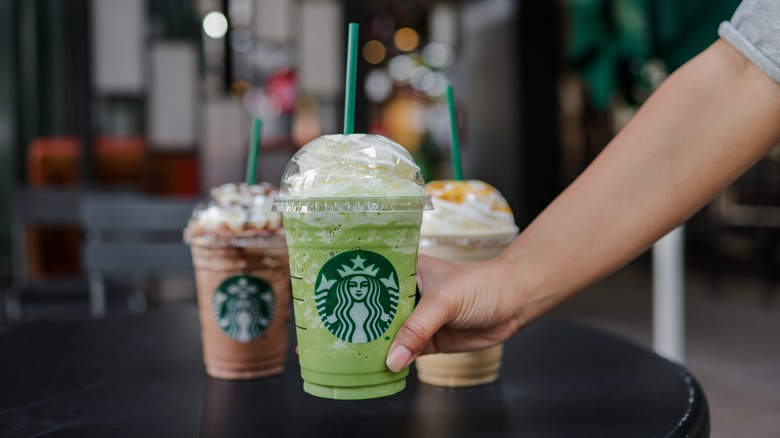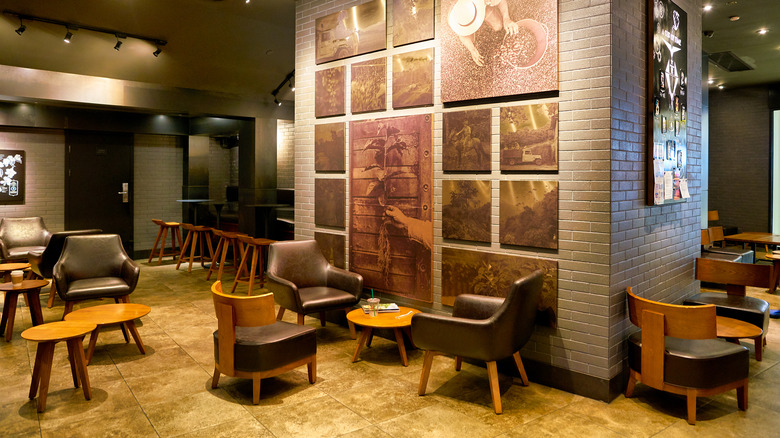The Psychological Reason Starbucks Tables Are All Round
Years after its origins in 1971, one coffee chain has built itself into one of the most admired food and beverage companies in the world: Starbucks. With its unique coffee combinations — somewhere in the realm of 87,000 possible options, according to Business Insider – and general availability all around the world, it makes sense why customers keep coming back. Whether you're traveling in Japan or smack dab in the middle of Arkansas, chances are you can find that familiar white and green mermaid staring you down somewhere in the general vicinity. With coffee's popularity at an all-time high, what exactly is it about Starbucks that keeps people coming back instead of venturing out to another cafe?
There are a few factors, ABC News reports. It could be that specialty drinks like Frappuccinos are unique to Starbucks. Its coffee should also always be fresh too, since, according to Business Insider, partners brew a new batch every 30 minutes. Knowledgeable baristas go through extensive training and its cafes are always a reliable source of free wifi. There's a lot of logic to choosing Starbucks over another place. But have you thought much about how its tables play a role in that decision? Yes, you read that right.
Some more Starbucks psychology
Starbucks has a lot of tricks up its sleeve to help reel in customers, according to Psychology Today, and it's not just about the coffee. Per Forbes, Starbucks' drive to make things personal is a big factor in its popularity. It starts with the company's mission, which is to "inspire and nurture the human spirit — one person, one cup, and one neighborhood at a time." We'd say that's a pretty intimate goal and it all starts in the cafes.
Forbes reports that the environment of Starbucks interiors is usually built to feel safe and relaxed — a comfortable alternative to a home office or workspace. The warm atmosphere extends through Starbucks' people too with its often renowned customer service (via Forbes). Partners at Starbucks generally follow rules that promote personal interactions like repeating orders back to customers for accuracy and acknowledgment, calling out names instead of drink orders, and not balking at the sound of a 26-syllable drink request.
TODAY attributes Starbucks' success to yet another thing: its extensive drink (and food) list. From the availability of sizes to the range of flavors, there's something to entice customers on all levels. With its popular limited-time treats too, from the ever-popular Pumpkin Spice Latte in the Fall to the short-lived Unicorn Frappuccinos (per The New York Times), it's also its specialty items that the chain brings to the market. Perhaps a bit surprisingly, the chain's very inviting round tables play a role.
Why the round face?
Like many things, the coffee chain's popularity lies (at least partly) in its good marketing skills. Former Starbucks CEO Jim Donald admitted the chain even goes so far as to study traffic patterns to place new stores in prime locations. One of the company's most successful drives, however, is its comfortable cafes. Weirdly enough, that idea includes making sure its tables are round. This is because psychologically, a round shape gives off a more comfortable vibe than a square one (via ABC News).
As reported by Business Insider, Karen Blumenthal backed up this claim after chronicling Starbucks for a year in her book "Grande Expectations." She explained that for one person sitting at a round table, the circular shape helps them look less alone, since circles are much more informal than a square. Additionally, those that come to a cafe in a group are encouraged to interact because everyone is equally seated without an individual seated at the head of the table.
You may also find the round tables at Starbucks uncomfortable: They are often purposefully squat and unstable, according to Business Insider. If you'd prefer to just drink your coffee and get out without sitting down, that's all good with Starbucks. This way they can breeze through more customers. So, whatever the official reason, round tables seem to work well for business.


